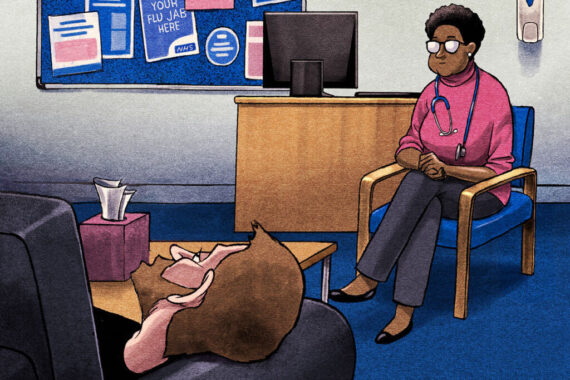In May, we focused on the mental health crisis sweeping the population just over two years after the onset of the Covid-19 pandemic. And GPs, of course, are bearing the brunt.
Our survey of 569 readers found that the impact on primary care of struggling mental health services broadly falls into three categories.
First, GPs are increasingly consulting about mental health problems. They told us that 38% of all consultations have a mental health component, compared with 25% before the Covid-19 pandemic.
Second, the criteria for secondary care referrals to be accepted are becoming harder to meet. Some 70% of GPs reported that their local trust had raised the threshold for adult referrals to secondary care – 14% officially and 56% unofficially.
Average waiting times for patients increased as a result. For urgent CAMHS cases, it was 48 days, while for substance misuse it was 120 days. Adults with eating disorders were waiting an average of 315 days to be seen.
Patients needing autism assessments faced the longest waiting times. Children and adults were waiting an average of 457 and 562 days respectively.
Third, and consequential to the previous points, GPs are providing mental health care and support beyond their capacity and expertise. In fact, 70% of respondents said they were practising outside their competency for children’s mental health, and 63% said the same when it came to adult patients’ mental health.
The pandemic has been a significant contributing factor to mental health decline. With the isolation of lockdowns, the closure of support services, and the psychological effects of long Covid, there brewed a perfect storm that continues to rage.
And, the types and complexities of mental health problems GPs were now dealing with was unprecedented.
For example, 86% of respondents to the Pulse survey said they were providing care for adults with suicidal ideation and a similar proportion (81%) were dealing with adults in mental health crises.
Some 69% were diagnosing children and adolescents with mental health problems, and more than half (55%) were continuing treatment for young patients without a clear shared-care plan.
Unsurprisingly, all this has been taking a huge toll on the mental health and well-being of GPs, too.
Back in March, Prof Dame Clare Gerada, former medical director of NHS Practitioner Health, told ministers that of the 5,000 people the service saw in the first year of the pandemic, around two-thirds were GPs.
By September, the number of GPs who had called the BMA’s mental health counselling service in the previous 12 months had risen 250% compared with before the pandemic.
All this begs the question: when doctors become the patients, who is left to carry the load? As the profession battles on amid the usual winter pressures and the strain increases, the outlook looks ever bleaker.













Pandemic, or the response to the pandemic?
Repeated and prolonged Lockdown with consequent social isolation.
Endless media obsessive doom-laden rumination about deaths and dying.
Interesting statistic – lifetime risk of death from rta higher than risk of death from Covid.